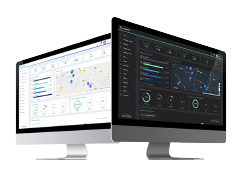
Yes, diesel pollutes much more than petrol
Sustainability | Environment | Pollution | Climate changeThe real diesel pollution: studies by Transport & Environment contrast that diesel cars are more polluting than petrol engines.
Various studies support the fact that diesel cars pollute more than petrol cars, buses and trucks. And yet the vast majority of drivers ignore the real truth; that diesel cars are more polluting than petrol, despite being led to believe otherwise. Diesel is anything but eco!
According to manufacturers, modern diesels, also known as Euro 6d-TEMP, pollute less since they strictly obey with the new emission regulations. However, a report commissioned by Transport & Environment corroborates quite the opposite: this type of engine reaches emission peaks up to 1,000 times higher than those legally established.
Although both diesel and gasoline engines emit carbon dioxide (CO2), diesel cars also emit nitrogen dioxide (NO2) and airborne fine particles (PM).
And even though the average emissions per kilometer is lower in diesel cars, the truth is that manufacturers have been deceiving us because they have omitted a fundamental part of the truth: emission peaks. And there is also another very important fact to take into account, since diesel pollution not only occurs during its use, but across the full lifecycle of the vehicle, including its manufacture.
Emission peaks generated by diesel vehicles
These pollution peaks occur when Diesel Particulate Filter (DPF) is cleaned or regenerated, which depending on the vehicle use can be carried out between 400 km and 1,200 km or, in daily terms, approximately every two weeks.
This car’s filter is characteristic of diesel cars and follows an automatic cleaning process that causes the emission of thousands of millions of polluting particles.
And worst of all, cleaning process can also occur in urban areas and last for up to 15km, with the health problems that can cause to people standing close to a metropolitan area.
Nonetheless, these types of vehicles pass homologation tests since these periods of particle filter regeneration are not taken into account and, consequently, this emission peaks go completely unnoticed.
The full lifecycle of a diesel car
Apart from emission peaks, the study carried out by Transport & Environment proves that diesel cars, throughout their useful life, emit almost 4 tons of CO2 more than their gasoline equivalents. Diesel pollution is real.
Diesel’s higher emissions are due to multiple factors:
- More energy-intensive refining of diesel fuel
- Heavier engines that involve more materials and more complexity in their production
- Higher emissions from biodiesel blended in diesel fuel
- Longer mileages because of the cheaper fuel price
A revealing study
Transport & Environment study analyzes the emissions of a Nissan Qashqai and an Opel Astra and shows emissions between 32% to 115% over the legal limit for particles during filter regeneration, respectively. And for smallest ultrafine particles, harmful total emissions increased between 11% and 184%.
In addition, tests also reveal that the number of particles emitted continued to be higher during urban driving for 30 minutes after the filter cleaning was ended.
The study also claims that the smallest suspended particles (PM) are not being taken into account in current official tests, and they are precisely the most dangerous for our health.
Therefore, these facts confirm that this tests ignore between 60% and 99% of real diesel particles emissions.
Transport & Environment also shows that 50 million dirty diesel vehicles registered in Europe with DPF have already been reached, after five years of the polluting emissions Volkswagen scandal.
And this study joins others such as the one done by International Council for Clean Transport (ICCT), which in 2016 already determined that diesel cars generated more nitrogen dioxide than trucks and buses. So, yes, the truth is that diesel cars are more polluting than petrol.
A test carried out by ICCT shows that, in real conditions, 90% of Euro 6 diesel cars exceed the limits set by European Union in terms of nitrogen dioxide emissions 4.5 times on average.
Volkswagen group scandal
The ICCT demonstrated obvious discrepancies between the information provided by manufacturers regarding emissions compared to the real data recorded on the road. And that's when they uncovered the manipulation scandal of the German giant Volkswagen, also known as "Dieselgate".
The scandal was significant. In 2015, it was revealed that Volkswagen group had introduced illegal software in their diesel cars in order to meet US standard emissions and thus being able to overcome the technical controls of the Clean Air Act of the United States Environmental Protection Agency (EPA). Finally, it was discovered that the vehicles involved emit up to 40 times more nitrogen dioxide than allowed.
Pollutant particles harmful to the environment and our health
The most dangerous thing about new diesel cars is that the particles they emit not only exacerbate global warming and accelerate climate change, but they also seriously harm our health, since they are elements that increase air pollution.
Yes, diesel vehicles consume less fuel than their gasoline equivalents, but they pollute the atmosphere up to four times more!
And why do they harm our health? Because above all they emit nitrogen dioxide (a greenhouse gas) and fine suspended particles, which are the main air pollutants breathable by humans and guilty of causing asthma, cancer and heart attacks.
To be more specific, only in Spain, almost 30,000 premature deaths per year are caused by air pollution.
The future claims electric mobility
Let’s do the maths. If approximately every two weeks a diesel emits 1,000 more particles than allowed, this process is repeated 24 times in a year. If we multiply, we get a total of 24,000 illegal particles emitted by a single diesel car per year, for 50 million vehicles circulating in Europe ... Too many zeros.
And if we also add the fact that, on average, diesel cars usually cost between € 2,000 and € 3,000 more than their respective petrol cars, they are not worth it at all!
After all, this type of study shows, once again, that we should firmly bet on electric mobility and, if possible, also bet on 0 emission solutions such as walking, using public transport or personal mobility vehicles: bicycles, electric scooters, etc.
💙 And how Place to Plug contributes to the environment and sustainability?
By empowering you to use electric vehicles offering an end to end solution for the entire EV charging industry, whether if you are an EV driver, a business, an institution or an operator!


Leave a comment